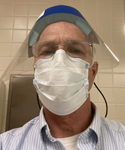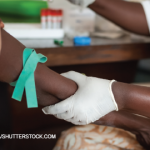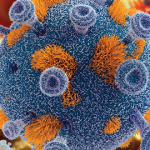 A young man sits down at my COVID-19 immunization station at Maine Medical Center and stares resolutely ahead, focusing on the far wall. He looks nervous. I make sure the needle and syringe are outside his field of vision. That should help. I pick up a Band-Aid from my box of supplies. It’s a Band-Aid large enough to cover a shark wound, and I wave it in front of his nose. “This is what we’ll use after the shot. You need to keep it on for one year.” He cracks a smile. I deliver the shot. A moment later he gives me the thumbs up sign and literally skips down the hallway.
A young man sits down at my COVID-19 immunization station at Maine Medical Center and stares resolutely ahead, focusing on the far wall. He looks nervous. I make sure the needle and syringe are outside his field of vision. That should help. I pick up a Band-Aid from my box of supplies. It’s a Band-Aid large enough to cover a shark wound, and I wave it in front of his nose. “This is what we’ll use after the shot. You need to keep it on for one year.” He cracks a smile. I deliver the shot. A moment later he gives me the thumbs up sign and literally skips down the hallway.
I am a volunteer COVID-19 vaccinator, overjoyed that after more than 335,000 deaths in the U.S. and 1.7 million deaths worldwide, two vaccines, one from Pfizer, the other from Moderna Pharmaceuticals, have been approved by the FDA to prevent COVID-19. Legitimate questions remain regarding the safety and effectiveness of the vaccines, but let’s put these important issues into perspective and celebrate a remarkable achievement: After only 11 months since the first patient was sickened with COVID-19 in the U.S., there is hope that the worst of the pandemic will soon recede.
Rapid Development
How unusual is it to have a vaccine developed and approved by the FDA in less than a year?
In the case of HIV, in 1985, when I was a visiting internal medicine resident rotating through the department of Rheumatology and Clinical Immunology at Yale Medical Center, HIV-1 was universally fatal. Decades later, we have effective medications for suppressing the virus, but to date, no vaccine has been approved for general use—although several vaccines are in clinical trials.1
We can also consider malaria. In 2019, 409,000 deaths due to malaria occurred worldwide, and two-thirds of those were of children under the age of 6.2 A trial completed in 2019 demonstrated that a new vaccine, Mosquirix, prevented approximately four in 10 predicted cases.3 This vaccine is a welcome beginning, but it’s relatively ineffective compared with traditional vaccination against polio or measles or rubella.
Why has science struggled to develop vaccinations to prevent HIV-1 or malaria? There is no simple answer. There may be some truth to the assertion that because malaria and HIV often infect the poor or those at the margins of society that vaccine funding has been insufficient. But this view dismisses the work of countless, talented scientists who spent their entire careers in vaccine research and failed to unravel the mystery of HIV-1 or malaria.




